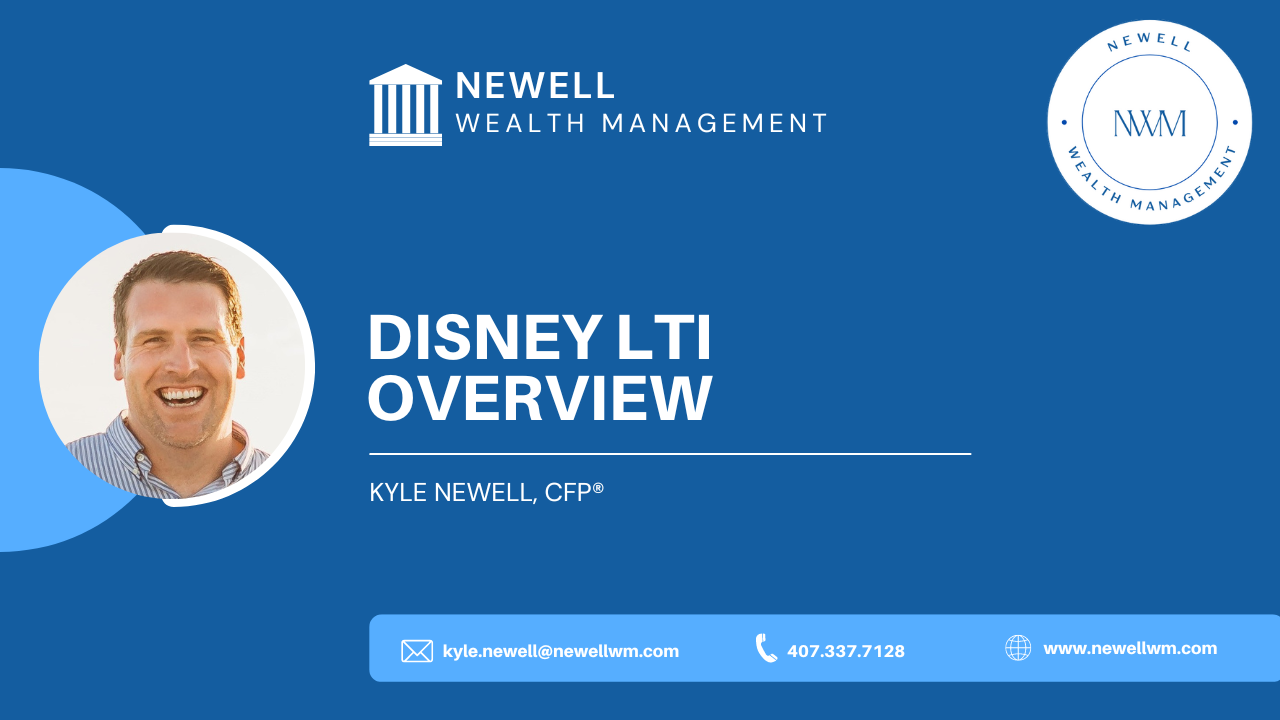Disney LTI Overview

You may or may not have heard the term LTI mentioned in a benefits meeting. It may be listed in your employee handbook. It’s not a new concept, but it’s one many companies, including Disney, use to reward employees.
I have many clients who are Disney employees (aka cast members). Many of them need clarification on the Disney LTI benefit, how it works, and if it will work for them. The best way to help is to start with the basics.
What Is Disney LTI?
LTI stands for “long-term incentive.” At its core, an LTI program is an additional form of compensation, on top of one’s salary and bonus, with some strings attached. These strings include the vesting schedule and how the benefit is paid out.
There was a time when it was paid in cash or stock, depending on your position level with the company. Different roles were given different options on how to receive LTI. They would award you in Disney stock that would automatically be paid out in cash. Today, if you are LTI eligible, it is paid out directly in Disney stock.
The Disney LTI program matches the compensation incentive to cast member performance objectives. The program is designed to align the company’s and employee’s goals. One influences the other in a circle of productivity.
Look at it this way. More efficient cast members are better at their roles and create more happiness and magic for guests. More magic for the guests means the company:
- Has more guests and visitors
- Produces more revenue
- Becomes more profitable
- Sees stock values rise
It’s ultimately a basic concept. Help the employee with their goals, and they will help the company reach theirs. Both are aligned with each other to achieve a positive outcome.
How Does Disney LTI work?
An amount is awarded based on your level within the company, VP, SVP, Director, etc. Your position level could impact the compensation amount. It’s important to note that you do not receive the total compensation at once.
Receipt of the LTI is based on the vesting schedule. You are awarded the compensation, which then vests over a specific period. Vesting schedules can and do change. Disney LTI used to be four years but has also been as short as two. Ultimately the company’s goals determine the vesting schedule for newly awarded Disney LTI.
A Basic Example
You have been awarded $50,000 in Disney stock that will vest over three years. The payouts will happen in June and December over those three years. Whenever your payout hits, the company will take some of the stock they are giving you to pay taxes.
LTI compensation is considered bonus income, so both federal income taxes and Social Security Medicare taxes must be withheld. The remainder will go into your Disney LTI account, currently held by Merrill Lynch. Once the stock is in your account, you can decide whether to keep or sell it.
What Are Some of the Factors that Impact the Amount of LTI?
A few things help determine a cast member’s LTI benefit.
1) Your Current Role
Are you a leader, VP, SVP, Director, etc.? The level of your position is one of the primary factors in the amount awarded in an LTI program.
2) Competitive Compensation
What is your compensation within the company? How does it compare from an industry standpoint? Disney wants to be competitive with regular wages based on different metrics and performances for both the company and the employee.
Staying competitive both within the company and against similar companies in the industry helps recruit top talent. LTI programs are one way to keep that talent.
3) Maintaining Talent
It is always in a company’s best interest to maintain talent. Competitive compensation certainly feeds into that goal but can also be a factor in awarding LTI. If leadership believes you to be a talented employee, it is often a consideration in your compensation award as a means of retention.
What Can You Do When You Receive Disney LTI compensation?
Once the Disney stock is paid out, you can keep it or sell it. Look at your overall financial goals to see which option will help you achieve them. It’s best to consider each one thoroughly before making decisions.
1) Keep it
I approach this with most clients by discussing how they view the company as an investment. Give yourself time to think about this. Disney cast members love the brand and the company, but we must do a more fundamental analysis of the company by separating personal feelings from financial ones.
Consider the following questions.
- Do you think the value of Disney stock is going to go up over time
- What’s the current stock price
- Is it well-valued, undervalued, above value
- Are you already heavily invested in Disney
Depending on your career stage, you may have a Disney pension or have purchased Disney stock within the Disney 401k. If you’re too concentrated in Disney, there may be too much risk specific to the performance of Disney and its stock. You need to quantify how much risk there may be to see if you need to diversify some for your financial benefit.
It’s a lot to consider. Answering these questions will help you decide whether you want to keep the stock as an investment.
2) Sell it
If the stock price is volatile, you may have some capital gains once it vests. When you sell it, any earnings above the original value will leave you with either short or long-term gains to deal with. Taxation becomes important when considering this option.
Maybe you weren’t sure what to do with your Disney LTI stock, so it sat in the account for several years. You will need to pay taxes on the amount if you have gains on it. Stocks that have experienced losses instead of gains may make selling and taking the loss worthwhile.
You may also choose to sell and reinvest it. Discuss the stock’s performance with your financial advisor or tax professional to discuss how selling could affect your taxes and overall financial picture.

Different Types of LTI
Restricted Stock Units
Most Disney LTI is handled via restricted stock units. The company pays out in Disney stock, and once it vests, it’s considered taxable income. Once received, you can decide what to do with it.
Stock Options
You may be given stock options depending on your position level with the company. Stock options bring their own considerations, especially tax considerations, because of the timing of taxation against when it vests and when you exercise the stock options.
There are some very specific, sometimes tricky rules to which one needs to pay attention. Talk with your financial advisor about how to best utilize stock options in your financial planning.
What’s the Value of Disney LTI?
More money is always a good thing. Disney LTI means you’re getting paid extra. You’re also getting the stock. Receiving the stock brings a little more responsibility of trying to do better for the company so that, in turn, the company does better for you.
Let’s say Disney gives you a $50,000 award which translates to a certain number of shares. You have a three-year period to wait for the shares to vest. Hopefully, the stock goes up in value during that time because you’re a good worker.
Your individual contributions are helping the overall organization do better. As you saw earlier, when the company does well, stock values rise, and the value of your LTI goes up. Everyone is happy.
Stock vs. Cash
The primary benefit of getting paid in stock versus cash is the potential of stock earning and growing over time. Of course, the inverse could also be true.
Rather than growing, the value could go down. No one wants to see a negative swing in their investment because it causes a decrease in your LTI compensation. In the world of investing, we know nothing is guaranteed.
I’ve had clients from other industries and firms who were paid LTI with company stock that did not work out well. Sometimes the stock lost significant value because the company was going through a tough time.
There is always a risk, especially when you are talking about stocks from one company. There are also times when the stock stays flat, and clients end up getting the same cash value as when the stock was awarded. The hope is that it follows a growth pattern, and you see gains instead of losses.
How Can You View or Access Your LTI?
Disney LTI is housed through Merrill Lynch. Speak with HR about how to find the website or visit the DLife Benefits page on the Hub. Once you are on the program site, you should be able to see what shares you’ve been granted and when they will vest based on the schedule that’s there.
I suggest downloading the available statement. It will provide all the details to see when the money is coming out so you can plan accordingly.
You already know that when it vests, you can keep it, reinvest it, or sell it for cash to cover regular living expenses. If you’re able, it may be better to look at it as a long-term investment into your retirement or future financial goals rather than using it to pay for current expenses.
Remember, that money is not guaranteed and can fluctuate in value. You don’t necessarily want to bank on having a certain amount of money coming in every year, and then a market change causes it to change and affect your financial situation.
What Happens When You Leave the Company?
The circumstances and timing of leaving the company will determine your options for handling your LTI. Let’s look at the most common ones and how they might affect your Disney LTI.
Retirement
Around the age of 60, many people start considering retirement. Typically, if you are around this age, have unvested shares, and retire, they will vest you the remainder of your shares over the next two or three years or the amount of time remaining.
Leaving for Other Employment
If you leave for other employment or prior to age 60, any unvested shares are forfeited. For easy numbers, let’s say you were given a $60,000 bonus that would pay you $10,000 twice per year ($20,000 annually for three years). You received the first-year payout but then leave the company to work elsewhere. The remaining $40,000 that is unvested will be lost.
If you are receiving LTI, most likely, you are good at what you do. The company recognizes that and wants to retain you as a cast member. Part of the reason for a vesting schedule is to incentivize you to continue working for Disney.
Recommendations
This article is based on 2023 information. The numbers can certainly change based on how the company changes the LTI program in the future. Still, it’s good to have a solid understanding of what it is, how it works, and some considerations around it.
I recommend reviewing your plan documents by talking with HR or referring to the Hub. Your Disney LTI plan documents will always take precedence. These documents offer specific details regarding your plan, vesting schedule, and what happens to the money if you leave.
If you would like to talk more about how Disney LTI fits into your financial plan and what you should think about or do with it, I’m happy to help.
We can meet virtually or in person if you live in the Central Florida area. Please email me at kyle.newell@newellwm.com, call/text at 407.337.7128.
Important Information
Newell Wealth Management, LLC (“NWM”) is a registered investment advisor offering advisory services in the State of FL and in other jurisdictions where exempted. Registration does not imply a certain level of skill or training. The presence of this website on the Internet shall not be directly or indirectly interpreted as a solicitation of investment advisory services to persons of another jurisdiction unless otherwise permitted by statute. Follow-up or individualized responses to consumers in a particular state by NWM in the rendering of personalized investment advice for compensation shall not be made without our first complying with jurisdiction requirements or pursuant an applicable state exemption.
All written content on this site is for information purposes only and is not intended to provide specific advice or recommendations for any individual. Opinions expressed herein are solely those of NWM, unless otherwise specifically cited. Kyle Newell and NWM are neither an attorney nor an accountant, and no portion of this website content should be interpreted as legal, accounting or tax advice. Material presented is believed to be from reliable sources and no representations are made by our firm as to other parties’ informational accuracy or completeness. There is no assurance that the views or strategies discussed are suitable for all investors or will yield positive outcomes. Investment involves risks including possible loss of principal and unless otherwise stated, are not guaranteed. Any economic forecasts set forth may not develop as predicted and are subject to change. All information or ideas provided should be discussed in detail with an advisor, accountant or legal counsel prior to implementation.
